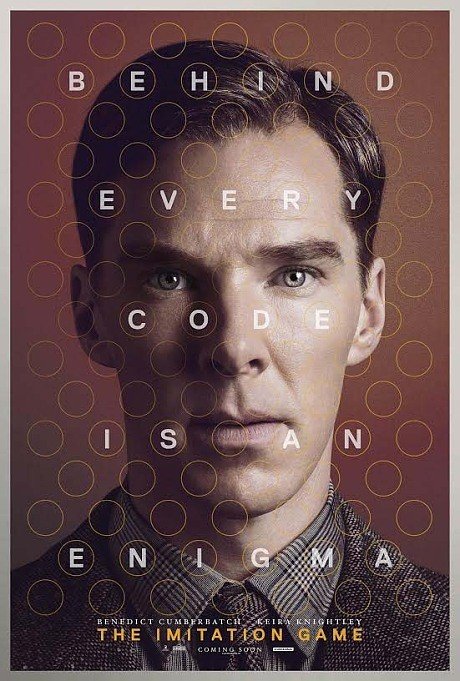Rating of
3.5/4
Cumberbatch shines in “The Imitation Game”
Evan Wheatley - wrote on 10/21/16
Can machines think? This is the main question posed in “Computer Machinery and Intelligence,” a 1950s paper published by Alan Turing. The paper's concepts surfaced in his single-handed design and construction of a machine that broke the German Enigma codes during World War II…or so the film says. While the historical accuracy of “The Imitation Game” comes into question on several occasions, the outstanding quality of the film’s acting, direction and story is no enigma.
The movie focuses on the life of Alan Turing, a British mathematician, computer scientist and cryptanalyst. The British Intelligence recruits Turing along with other cryptographic minds to crack the Enigma codes that the Nazis use as secret communication during the war. The film’s narrative alternates between three significant times in Turing’s life: his education at Sherborne School as a teenager, his classified work with Enigma during the war and the investigation surrounding Turing’s sexual orientation in 1952.
The settings of the Enigma machines change daily as the war progresses. The small group of cryptographers has 18 hours each day to figure out the settings of the machines before the Germans alter the settings the next day. This is a virtually impossible task for the team to accomplish because of the infinite number of possible settings the machine possesses, causing progressive frustration amongst the team. Turing’s initial rudeness, apparent social detachment and unwillingness to work with the rest of the team only add to the growing tension.
Turing conceives, designs and begins to build a machine that he believes will be able to mull through the numerous Enigma settings possibilities at a considerably fast rate. A machine like this has never been built, much less proven to work. His endeavor brings about much skepticism and agitation from the team. Over time however, especially after the acquisition of Joan Clarke (Keira Knightly) to the team, Turing begins to treat his colleagues with respect and gains their trust.
To say that Benedict Cumberbatch had an amazing performance at this point in his career is the equivalent of saying the sky is blue, and it remains blue yet again as Cumberbatch knocks it out of the park.
Turing as shown in the film is extremely intelligent but lacks normal social skills. He is not the most likable guy; he has trouble interacting with others, takes everything that is said to him literally and has a sense of arrogance that puts others off. However, there is also warmth about his character and he genuinely desires to be liked by others. Cumberbatch expresses both aspects of this persona beautifully.
The supporting cast is equally fantastic. Those who play the members of Turing’s team (Matthew Goode, Allen Leach, Matthew Beard and Keira Knightly) have great chemistry with each other and Cumberbatch. Alex Lawther as the young Alan Turing mimics Cumberbatch’s portrayal well, and viewers will truly believe the struggles he endures from being different than everyone else.
Graham Moore took home an Academy Award for Best Adapted Screenplay for his work on the film, and it's not hard to see why. The well-written script is the fuel for the gripping, emotional drama exhibited in the actors’ performances.
Morten Tyldum’s direction is not to be ignored either. The interchange between the various time periods in Turing’s life are done smoothly, and the non-linear story telling is carried out excellently. The writing, directing and acting present Turing's struggle well as a homosexual in the 1950s and the punishment that he had to endure because of it. While both aspects of the production are good from a narrative standpoint, the direction and the writing is also where the main issue of the movie lies.
In “The Imitation Game,” viewers are led to believe that Turing built the machine that cracked Enigma and conceived its design virtually by himself. In reality however, the Polish Intelligence gave a primitive version of the machine to the Government Code and Cypher School in 1939, and Turing was hired to make improvements on the machine based on his knowledge of computers. Also, unlike the movie portrays; Turing was actually well liked by his colleagues and was placed as the head of the operation until 1942.
This is one of several factual errors present in “The Imitation Game” that range from Turing giving his machine a name, to John Cairncross being a cryptanalyst and a somewhat influential character in the story.
Despite these historical inaccuracies, the movie has received widespread critical acclaim. In addition to winning the Best Adapted Screenplay award, it also received nine Oscar nominations including Best Picture, Best Director and Best Actor.
“The Imitation Game” is a riveting drama with stellar performances, excellent writing and solid direction. Among the better films of 2014, it remains a must-see for 2015.




